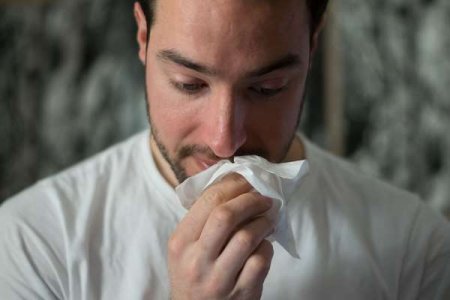Cold weather myths exposed—what’s actually making you sick
- Replies 0
As the weather shifts, so do the familiar sniffles and sneezes that seem to come with it.
Alongside them, long-standing advice resurfaces—warnings about bundling up, avoiding the cold, and staying dry.
But how much of what we’ve been told is fact, and how much is just an old myth? Experts reveal what’s really at play when illness strikes.
Dr. Christopher Choi, a board-certified internist in Las Vegas, sets the record straight—wet hair won’t make you sick.
He explains that colds are caused by viruses, mainly rhinoviruses, and not by temperature, damp hair, or chilly air.
"Wet hair does not directly have any bearing on catching a cold," says Dr. Choi.
"A cold is caused by viruses, typically rhinovirus." These viruses spread through airborne droplets from an infected person's cough or sneeze, or by touching virus-laden surfaces and then touching your face.
If wet hair isn’t the culprit, why do people often associate cold weather with getting sick?
Dr. Choi suggests that exposure to cold temperatures can cause a slight drop in body temperature, which might make a person more vulnerable to infection—especially if their immune system is already weakened.
Additionally, cold weather can constrict blood vessels in the nose, potentially reducing the body’s natural defenses against viruses.
Since rhinoviruses commonly enter through the nasal passages, this could create a more favorable environment for infection.
Now that we’ve busted the wet hair myth, here’s what truly helps reduce your risk of getting sick in colder months:
Looking for more ways to stay healthy? Find out the essential tips to dodge norovirus, COVID, flu, and RSV outbreaks—so you can stay protected all season long!
 Have you ever believed the wet hair myth or followed other cold-weather health advice? What are your go-to tips for staying healthy in winter? Share your thoughts in the comments below!
Have you ever believed the wet hair myth or followed other cold-weather health advice? What are your go-to tips for staying healthy in winter? Share your thoughts in the comments below!
Read more: Why winter makes you more prone to sickness—here’s the overlooked truth
Alongside them, long-standing advice resurfaces—warnings about bundling up, avoiding the cold, and staying dry.
But how much of what we’ve been told is fact, and how much is just an old myth? Experts reveal what’s really at play when illness strikes.
Dr. Christopher Choi, a board-certified internist in Las Vegas, sets the record straight—wet hair won’t make you sick.
He explains that colds are caused by viruses, mainly rhinoviruses, and not by temperature, damp hair, or chilly air.
"Wet hair does not directly have any bearing on catching a cold," says Dr. Choi.
"A cold is caused by viruses, typically rhinovirus." These viruses spread through airborne droplets from an infected person's cough or sneeze, or by touching virus-laden surfaces and then touching your face.
If wet hair isn’t the culprit, why do people often associate cold weather with getting sick?
Dr. Choi suggests that exposure to cold temperatures can cause a slight drop in body temperature, which might make a person more vulnerable to infection—especially if their immune system is already weakened.
Additionally, cold weather can constrict blood vessels in the nose, potentially reducing the body’s natural defenses against viruses.
Since rhinoviruses commonly enter through the nasal passages, this could create a more favorable environment for infection.
Now that we’ve busted the wet hair myth, here’s what truly helps reduce your risk of getting sick in colder months:
- Wash your hands
- Avoid touching your face
- Steer clear of sick individuals
- Dress appropriately for the weather
- Disinfect frequently touched surfaces
Looking for more ways to stay healthy? Find out the essential tips to dodge norovirus, COVID, flu, and RSV outbreaks—so you can stay protected all season long!
Key Takeaways
- Doctors confirm that wet hair does not cause colds—viruses like rhinoviruses are responsible.
- Colds spread through airborne droplets and contaminated surfaces, not through exposure to cold temperatures alone.
- Chilly weather may weaken the immune system slightly and constrict nasal blood vessels, making it easier for viruses to take hold.
- Preventing colds involves frequent handwashing, avoiding face-touching, staying warm, and disinfecting surfaces.
Read more: Why winter makes you more prone to sickness—here’s the overlooked truth







